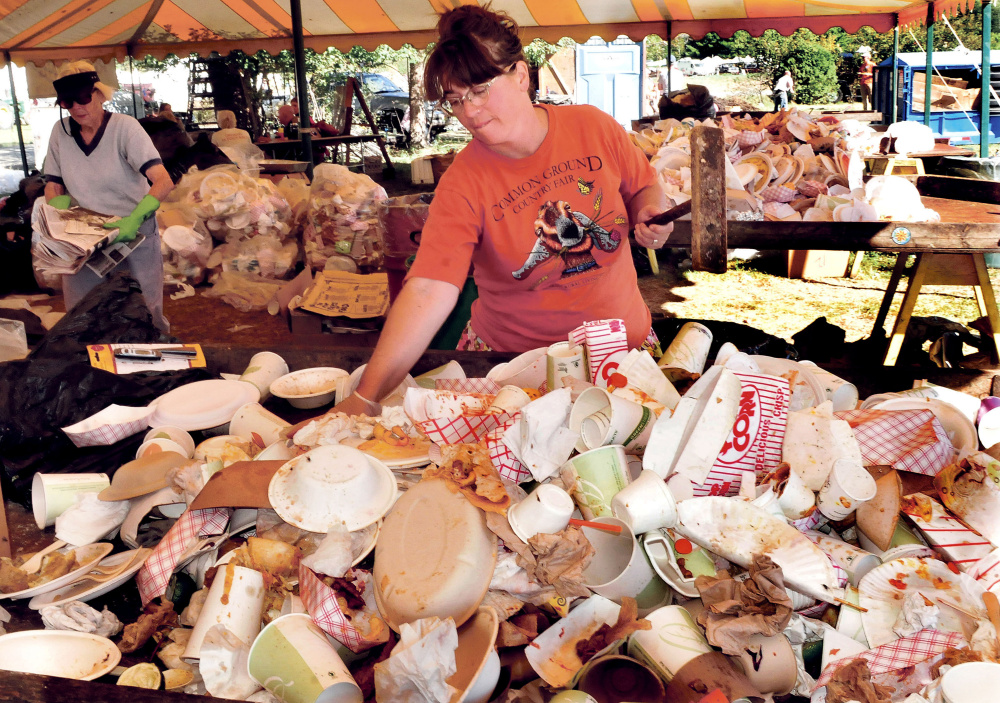UNITY — At the Common Ground Fair, plates of tofu frites with cranberry ketchup and black bean and winter squash tacos come served in recyclable and compostable containers.
Incorporating environmentally-friendly packaging is part of the rules of the annual fair, which also mandates that vendors use Maine-sourced and organic ingredients when they can. Scattered throughout the fairgrounds are recycling stations where fairgoers are asked to sort their trash into different containers for mixed recycling, returnables and compost.
But what happens to those items when the containers get full?
The answer can be found in a far-off corner of the fairgrounds, beyond the antique tractors and next to the site of the manure-tossing contest, where a bright sign invites visitors to “Come Sort Your Share.”
Over the course of the three-day fair, dozens of volunteers come to the compost and recycling tent to sort trash — which they don’t refer to as trash but as “discarded resources.”
They wash recyclables and create a large compost pile that will eventually be turned into soil and used to grow things at the fairgrounds — which is also the home to the Maine Organic Farmers and Gardeners Association.
The recycling is part of an effort to reduce the amount of waste that is trucked to landfills after the fair, but also to educate fairgoers on the benefits of composting and how they can incorporate composting and recycling into their own homes.
“It’s kind of the goal of the fair to educate people about alternative lifestyle practices,” said 21-year-old Maya Critchfield, who is a co-composting and recycling coordinator with her mother, Lisa Willey Critchfield. “There are so many resources here it would just be a total waste to throw things away.”
The fair, sponsored and organized by MOFGA, typically draws about 60,000 people each year.
Attendance this year included 18,700 people on Friday and about 26,000 on Saturday, said Willey Critchfield.
“That’s a lot of people,” she said. “And we have to process everything they throw out.”
Throughout the day, volunteers on bicycles ride around the fairgrounds collecting bags from the recycling stations. They deliver the bags to the recycling and compost tent, where they are sorted into piles.
“I think people are improving every year,” said Kendall Hinkley, a fair volunteer who works for the group Garbage to Garden, a curbside compost program in Portland. “At the fair people are kind of on a mission. They see things and they get distracted as they’re trying to throw things out, but it’s something we’re always working on.”
“I think it’s consistent with the fair and it’s a good idea,” said Paul Millard, one fairgoer who took the time to carefully pull the dirty silverware out of a stack of plates and put it in the proper containers on Sunday.
Yet while many fairgoers are conscious of putting items into the right containers, it doesn’t always happen, Willey Critchfield said.
Bicycle-riding volunteers like Unity-resident Hauns Bassett, are also tasked with picking up trash that doesn’t make it into the containers and lands on the ground. Bassett, a teacher at nearby Mount View High School, said he doesn’t mind the clean-up.
“There’s something about helping to make the fairgrounds look nice that’s nice,” he said. “I like doing whatever I can and riding the bike is nice, because you get to see where you want to shop and eat later on.”
There are some things at the fair that simply can’t be recycled or used in compost making, like plastic straws and some types of paper. Odd items like hangers or a brand-new meat thermometer still in its wrapping — an example of an oddity found on Sunday — also need to be removed.
While much of the leftover food and paper can be used to make compost, Willey Critchfield said that only so much paper can be used in the compost-making process, so some of it does get sent to the trash.
By Sunday the volunteers had managed to sort a large amount of paper and vegetable matter into the compost pile. It is compsted on site and used as nutrient-rich soil for MOFGA’s orchards and gardens.
Willey Critchfield, who has been a volunteer at the fair for the last 24 years, said that in recent years the compost and recycling tent has also gotten involved in doing more outreach and education.
“We try to make it fun but also force people to think about ‘Where is it going?'” Willey Critchfield said. “When we throw something away, where is away? That’s part of the problem we’re in right now, is that we’re such a disposable society.”
On Sunday, while volunteers sorted through bags of paper and discarded food at one end of the compost and recycling tent, other fairgoers gathered for informational sessions on topics such as “Our Zero Waste Wedding,” “Homemade Deodorant” and “Construction: Dumpster Dives into Funky Furniture.”
The volunteers didn’t have an estimate of how much compost and recycling they had processed by Sunday afternoon, but over the course of the three days they had filled just three small dumpsters with actual trash.
“It gets people thinking about the questions MOFGA wants them to answer by coming to the fair,” said volunteer Chris Childs. “That is, what is my footprint? How much of an impact is my participation in the fair having on the environment?”
Rachel Ohm — 612-2368
Twitter: @rachel_ohm
Send questions/comments to the editors.






